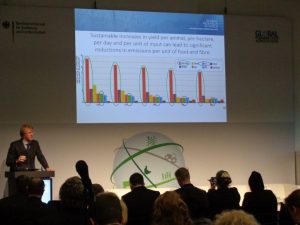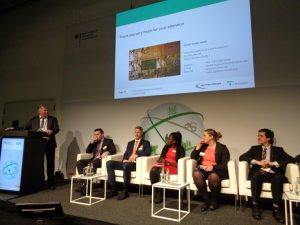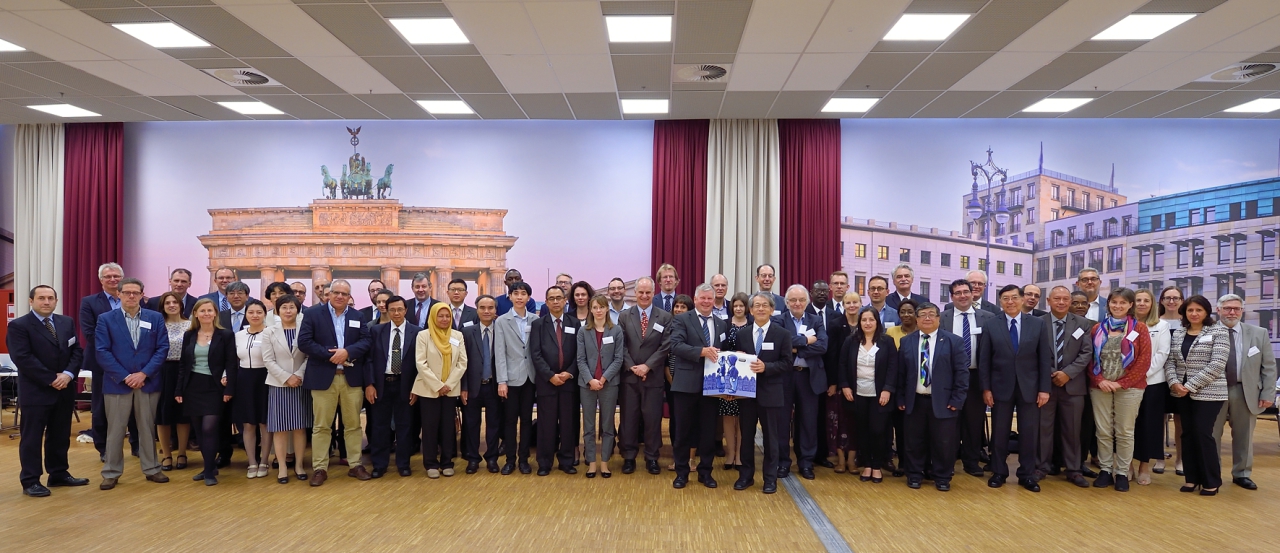The Thünen Institute, Germany, is currently offering a funded PhD position within a project aiming at improving the German agricultural GHG inventory:
The position is for a fixed term of four years and to be filled at the earliest opportunity. The position is directed to applicants who, in addition to their employment, wish to pursue their own
academic career, in particular their doctorate. In this context, the Thünen Institute of Climate-Smart Agriculture cooperates with various universities. The employment is a fixed-term position in accordance with §2 (1) sentence 1 of the Wissenschaftszeitvertragsgesetz (German law regarding academic fixedterm contracts).
Project tasks:
- Conduct literature studies and meta-analyses to derive refined emission factors for calculation of
nitrous oxide and ammonia emissions from agricultural soils - Acquire and model necessary regionalized activity data, in particular regarding nitrogen
fertilization in agriculture - Create regional nitrogen balances and harmonize greenhouse gas reporting with reporting under
the European Nitrates Directive - Create projections and evaluate mitigation options based on regionalized emission factors
- Scientific peer-reviewed publications
- Implement the new model approaches in the national inventory
Requirements:
- M.Sc. in applied statistics, geoecology, agriculture, environmental or soil sciences, meteorology or
related subjects. The degree must fulfill requirements for PhD candidates set by German
universities (see www.research-in-germany.org/en/jobs-and-careers/info-for-phdstudents/language-requirements.html). A master’s thesis with an above-average grade is
expected. - Excellent knowledge and experiences in statistics and empiric modelling
- Good knowledge of biogeochemistry and soil science is desired
- Basic familiarity with agriculture is desired
- Candidates need to be proficient with R and Excel, basic knowledge of python would be an
advantage - Team spirit, flexibility, high motivation and the ability to work independently
- Scientific curiosity and willingness to work on a doctoral thesis
- Excellent communication and writing skills in English, willingness to learn German
Read more and apply on the the Thünen Institute Website.
The 11th Global Forum on Food and Agriculture (GFFA) “Agriculture Goes Digital – Smart Solutions for Future Farming” was held in Berlin, Germany from 17th to 19th January.
The GRA organised an expert panel “Blue skies for green farms: a 21st century research agenda,” which was chaired by the GRA Council Chair, Dr. Wolfgang Zornbach, Federal Ministry of Food and Agriculture, Germany. Participating in the panel were the GRA Special Representative, Hayden Montgomery, Daniel Tudela Staub, Thünen Institute of Farm Economics, and a panel of young farmers from the World Farmers Organisation, including Tero Sarkala, Finland; Martha Agyemang, Ghana; Brian Rushe, Ireland; Sarah Crofoot, New Zealand. The panel discussion addressed plausible agricultural development pathways to reduce agricultural greenhouse gas emissions and included a presentation of global mitigation research being conducted through the Global Research Alliance by its members and partners across livestock, crops and rice production systems as well as a deep-dive into soil research and farm economics being conducted by Germany and collaborators in the Agri-Benchmark initiative.
The GRA Special Representative also participated in an event organised by the World Farmers Organisation (WFO), which explored the opportunities and challenges of digitalisation for young farmers as well as the ways in which businesses and industry can help farmers achieve sustainable food security.
The GFFA is an annual international conference, organised by the German Federal Ministry of Food, Agriculture and Consumer Protection. The aim of the conference is to address key questions regarding the future of the global agri-food industry. The conference provides representatives from the worlds of politics, business, science and civil society with the opportunity to share ideas and enhance their understanding on a selected topic of current agricultural policy, and is the world’s largest conference of agriculture ministers. To read more about the GFFA click here.
The final summary report is now available from the ‘International Conference on Agricultural Greenhouse Gas Emissions and Food Security – Connecting Research Policy & Practice’ focused on agricultural GHG emission reduction in light of climate change, sustainable agriculture, and food security.
The conference was held on the 10-13 September 2018 in Berlin, Germany, alongside the GRA Council meeting, and brought together approximately 300 scientists and stakeholders from government, public administration, industry and farmer organisations. Thematic discussions brought together participants to discuss key challenges facing agricultural production and the reduction of GHG emissions from both a scientific and policy perspective identifying a key statements and recommendations for each topic.
A few key take away messages:
- A greater focus on how to act upon scientific findings and implement scientific recommendations is needed
- Move to a science of implementation, not just the science of options or measurement
- More boldness in policy design: large-scale initiatives and learning
- Co-designing solutions with farmers, investors, input suppliers, advisory services to mainstream mitigation is essential
- For MRV regional data platforms, novel methods and information systems are promising solutions
- Higher priority to reduce loss and waste: food and other resources – circularity
- Ensuring effective policy coordination and coherence
- political will – we need it all: top-down and bottom-up, good governance
- Koronivia Joint Work on Agriculture: science, practice and policy – all have a role to play
The conference was organised by the Global Research Alliance (GRA) and the Joint Programming Initiative on Agriculture, Food Security and Climate Change (FACCE-JPI) of the European Commission, in partnership with CGIAR-CCAFS and funded by the German Federal Ministry of Food and Agriculture and supported by its Federal Research Institute for Rural Areas, Forestry and Fisheries (Thünen Institute).
Each organisation presented to conference participants on their key research achievements and outcomes and provided a wrap up of the key outcomes from the conference. The organisations were represented by:
- Hayden Montgomery (GRA Special Representative)
- Hartmut Stalb (Chair of FACCE – JPI)
- Bruce Campbell (CCAFS & CGIAR Representative); and
- Lini Wollenberg (Flagship Leader of Low Emissions Development at CCAFS (USA))
Click here to view the final summary report.
Alternatively, to learn more about the conference click here for the final summary slides.
The eighth annual Council Meeting for the Global Research Alliance on Agricultural Greenhouse Gases (GRA) was held 10-11 September in Berlin, Germany. This meeting provided an exciting yet unique opportunity to cooperate and merge various initiatives in the context of sustainable agriculture, climate change, and food security. This meeting saw the handover of Council Chair from Japan to Germany and the acceptance of Indonesia as vice-Chair.
Key outcomes of this meeting included:
- acceptance of two new GRA Flagships, one on Circular Food Systems and the other on Nitrogen;
- agreement for the GRA to support the UNFCCC Koronivia joint work on agriculture; and
- the announcement of several upcoming capability building opportunities supported by the GRA and our partners
This year’s meeting was held alongside the International Conference on Agricultural GHG Emissions and Food Security – Connecting Research to Policy and Practice, jointly organized by the Global Research Alliance (GRA) and the Joint Programming Initiative on Agriculture, Food Security and Climate Change (FACCE-JPI) of the European Commission, in partnership with CGIAR-CCAFS. The conference was funded by the German Federal Ministry of Food and Agriculture and supported by its Federal Research Institute for Rural Areas, Forestry and Fisheries (Thünen Institute).
Representatives from 31 member countries that attended the meeting include Argentina, Australia, Brazil, Canada, China, Egypt, Finland, France, Germany, Ghana, Indonesia, Ireland, Japan, Lithuania, Netherlands, New Zealand, Norway, Paraguay, Senegal, Spain, Sri Lanka, Sweden, Switzerland, Thailand, Tunisia, United Kingdom, United States of America, Uruguay, Vietnam, and Zimbabwe. Kenya also attended the meeting as an Observer country.
Partner organisations who attended this meeting include the Centre for Research and Education in Tropical Agriculture (CATIE), Climate and Clean Air Coalition (CCAC), Consultative Group on International Agriculture Research (CGIAR), Climate Change, Agriculture and Food Security (CCAFS), International Centre for Tropical Agriculture (CIAT), Food Security, Agriculture and Climate Change – Joint Programming Initiative (FACCE-JPI), Regional Fund for Agricultural Technology (FONTAGRO), Food and Agriculture Organisation of the United Nations (FAO), International Soil Reference and Information Centre (ISRIC), World Agricultural Forum (WAF), World Farmers Organisation (WFO). The Nationally Appropriate Mitigation Action (NAMA-Facility) was also invited to present their work at the meeting.
The ‘International Conference on Agricultural Greenhouse Gas Emissions and Food Security – Connecting Research Policy & Practice’ has opened a call for abstracts.
The conference will focus on agricultural GHG emission reduction in the light of climate change, sustainable agriculture, and food security.
Under the guiding question “What are options, global potentials and visions to the mitigation of greenhouse gases and the enhancement of carbon sinks by agriculture?” we would like to broaden the scope of the scientific conference and focus on holistic, integrative state-of the art research in the light of political and societal challenges relevant for implementing climate action under the Paris agreement.
Abstracts must be submitted by the 30th April using the website: http://www.agrighg-2018.org.
The Johann Heinrich von Thünen-Institute, Germany has a vacancy for a Scientific assistant for six months that would undertake soil-vegetation modelling contributing to an European Research Area Network – Monitoring and Mitigation of GHGs from Agri- and Silvi- culture (ERA-GAS) project ‘Mitigating Agricultural Greenhouse Gas Emissions by improved pH management of soils’ (MAGGE-pH).
Applications are open until 10th December 2017 – see the position description to apply for this opportunity.



